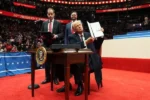Imagine a big argument between two teams, where one side believes they should play by their own rules, and the other side thinks everyone should follow the same rules. This is happening in real life right now between the Trump administration and New York State! Recently, the new Attorney General, Pam Bondi, announced a lawsuit against New York over a law that allows some immigrants to get driver’s licenses. This law is important because it affects how people drive and how the government handles immigration. Let’s dive deeper into what this lawsuit means and why it has everyone talking!
| Category | Details |
|---|---|
| Lawsuit Overview | The Trump administration, through Attorney General Pam Bondi, filed a lawsuit against New York over its immigration laws. |
| Key Law Involved | Driver’s License Access and Privacy Act (Green Light Law) allows undocumented immigrants to obtain driver’s licenses while prohibiting DMV data sharing with federal immigration agencies. |
| Lawsuit Claims | New York is obstructing federal immigration enforcement and violating federal laws regarding illegal immigration. |
| Attorney General’s Statement | Bondi claims New York’s law allows illegal immigrants to evade law enforcement, endangering public safety. |
| Response from New York Officials | Governor Hochul and Attorney General James defended the law, stating it protects the rights of all New Yorkers and is legally upheld. |
| Legal Basis for State Law | New York law allows federal access to DMV data with a warrant, contrary to Bondi’s claims of obstruction. |
| Future Implications | The lawsuit may set a precedent for how states can implement their immigration laws amid federal challenges. |
Understanding the Green Light Law
The Green Light Law, officially known as the Driver’s License Access and Privacy Act, was enacted in New York in 2019. This law allows immigrants who are living in the country illegally to apply for and receive driver’s licenses. By doing so, it aims to ensure that all drivers can be tested on their knowledge of traffic laws. This means that even if someone is not legally documented, they can still drive safely and legally within the state, promoting safer roads for everyone.
Additionally, the law includes important privacy protections. It prevents local sheriff’s offices from sharing the personal information of these drivers with federal immigration agencies. This aspect of the law is designed to protect the privacy and safety of individuals, ensuring that they can go about their daily lives without fear of deportation simply for holding a driver’s license. This law has sparked debate, especially regarding its impact on federal immigration enforcement.
Understanding the Green Light Law and Its Implications
The Green Light Law, enacted in New York in 2019, allows undocumented immigrants to obtain driver’s licenses while safeguarding their personal information from federal immigration authorities. This legislation aims to enhance road safety by ensuring that all drivers are trained and licensed, regardless of their immigration status. By enabling access to driver’s licenses, the law seeks to integrate immigrants into society, allowing them to travel safely and legally for work or emergencies without fear of deportation.
Despite its intentions, the Green Light Law has faced criticism, particularly from the Trump administration, which argues that it obstructs federal immigration enforcement. The lawsuit filed by Attorney General Pam Bondi highlights concerns that the law undermines efforts to combat illegal immigration by preventing local law enforcement from verifying the identities of individuals they encounter. This conflict underscores the ongoing debate over the balance between state rights and federal immigration policies.
The Legal Battle: A Clash of State and Federal Powers
The lawsuit against New York represents a significant clash between state and federal powers concerning immigration laws. The Trump administration’s stance is that states cannot inhibit federal efforts to enforce immigration laws, asserting that New York’s Green Light Law constitutes obstruction. This legal contention raises important questions about the extent of state sovereignty and the federal government’s authority in immigration matters, reflecting broader national tensions around immigration policy.
As the legal battle unfolds, it is crucial to observe how the courts interpret the relationship between state laws and federal immigration enforcement. Past precedents have shown a tendency for courts to uphold state laws that do not directly contravene federal statutes. The outcome of this case could set a precedent for future state legislation on immigration and influence how similar laws are approached across the country.
Responses from New York State Leaders
In response to the lawsuit, New York leaders have firmly defended the Green Light Law, emphasizing its role in protecting the rights of all residents. Attorney General Letitia James and Governor Kathy Hochul have characterized the lawsuit as a politically motivated attack rather than a legitimate legal challenge. They assert that the law prioritizes public safety and community trust, allowing all New Yorkers, regardless of immigration status, to drive legally and responsibly.
Hochul’s remarks highlight a commitment to maintaining state laws that prioritize the safety and privacy of residents. By challenging the federal government’s claims, New York leaders aim to assert their authority and reinforce the state’s stance on immigration. This conflict not only illustrates the divide between state and federal immigration policies but also reflects broader societal debates about immigration and community safety.
The Broader Context of Immigration Policy in America
The ongoing disputes over immigration laws, such as the Green Light Law, are emblematic of larger national conversations regarding immigration reform in the United States. Under the Trump administration, a hardline approach to immigration enforcement dominated policy discussions, leading to numerous executive actions and lawsuits aimed at curbing illegal immigration. This legal battle in New York is just one example of how state-level initiatives can clash with federal immigration enforcement efforts.
As the 2024 election approaches, immigration remains a pivotal issue for many voters, influencing campaign strategies and policy proposals. The legal outcomes of cases like the one against New York could have far-reaching implications for how states govern immigration-related matters and may affect public opinion on immigration policies. The intersection of state and federal powers will continue to shape the landscape of immigration law and enforcement in the United States.
Frequently Asked Questions
What is the Green Light Law in New York?
The **Green Light Law** allows immigrants without legal status to get **driver’s licenses**. This law also keeps their information private from **federal immigration agencies**.
Why did the Justice Department sue New York?
The **Justice Department** sued New York because they believe the Green Light Law stops the government from managing **illegal immigration**. They think this law is not constitutional.
What did Attorney General Pam Bondi say about this lawsuit?
Attorney General **Pam Bondi** claimed the lawsuit is necessary to protect the public. She argued that the law makes it hard for police to know who they are dealing with during traffic stops.
How does the Green Light Law affect police work?
The law makes it difficult for **police officers** to check the backgrounds of drivers who have **illegal licenses**. This can lead to safety concerns if they stop someone with a criminal history.
What was the response from New York leaders?
New York leaders, like **Governor Hochul**, defended the Green Light Law. They believe it protects the rights of all New Yorkers and keeps communities safe from discrimination.
What does it mean when a state is accused of obstructing federal law?
When a state is said to be obstructing federal law, it means they are believed to be making it harder for the federal government to enforce its rules, like those regarding **immigration**.
What could happen next in this legal battle?
This lawsuit could lead to a **court case** where judges decide if the Green Light Law is legal or if it must change. The outcome could impact many people’s ability to get driver’s licenses.
Summary
The content discusses a lawsuit filed by the Justice Department against New York concerning its immigration laws, particularly the Green Light Law, which allows undocumented immigrants to obtain driver’s licenses. The lawsuit claims this law obstructs federal efforts to combat illegal immigration, asserting that it prevents law enforcement from accessing crucial DMV data. Attorney General Pam Bondi emphasizes the need to stop violent crime linked to undocumented immigrants, while New York officials, including Governor Kathy Hochul, defend the law as vital for protecting residents’ rights. The dispute highlights ongoing tensions between state and federal immigration policies.







